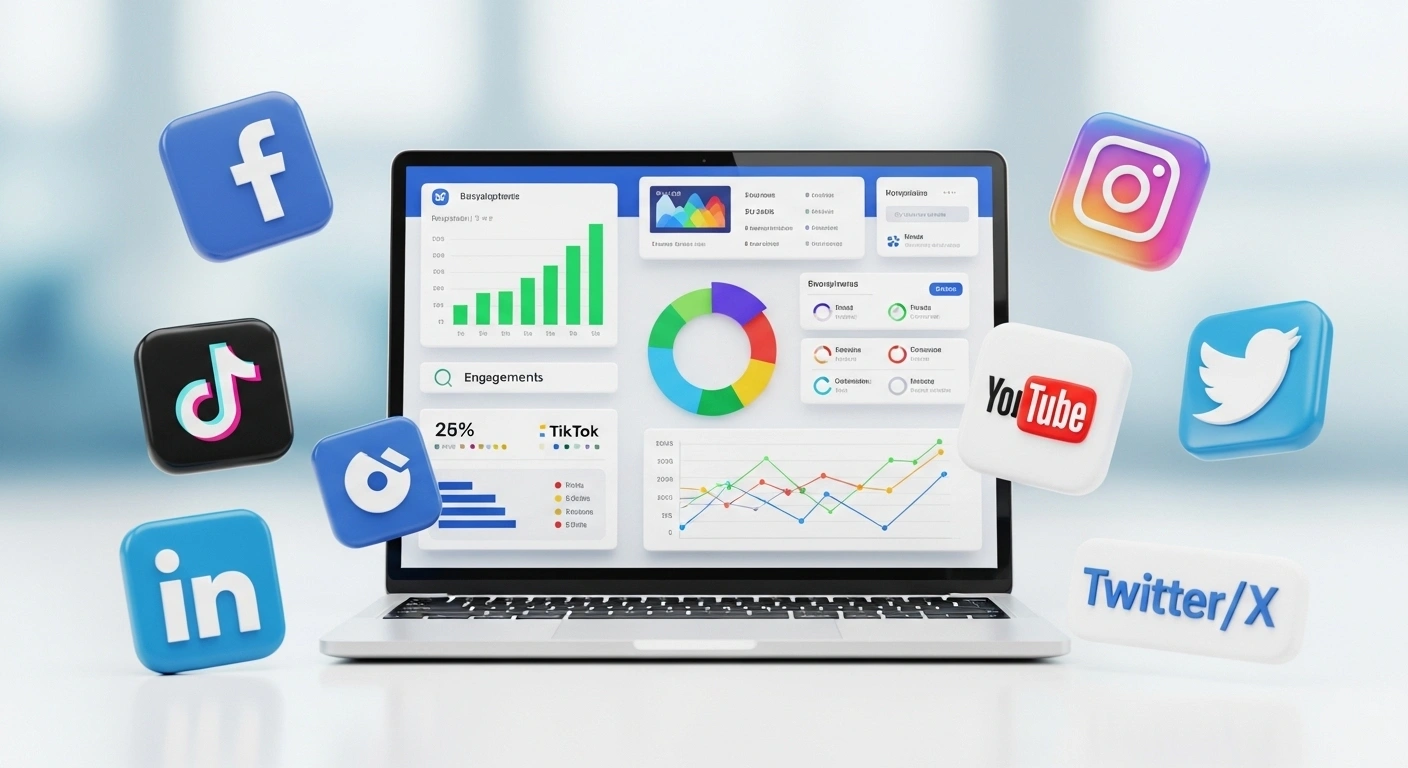Digital Marketing in 2025: Strategies, Tools, and Insights for Business Growth
In today’s tech-driven world, digital marketing has become the core of business success. Every brand—big or small—needs a strong online strategy to reach its audience, build credibility, and drive consistent growth. Traditional marketing alone can no longer keep up with the pace and precision that the digital world demands.

This comprehensive guide explores what digital marketing really means, why it’s crucial for modern businesses, and how innovative technologies, including AI and social media, are transforming the landscape in 2025.
Understanding Digital Marketing
Digital marketing refers to promoting products, services, or brands through digital platforms such as search engines, social media, email, and websites. Unlike traditional methods like print or television advertising, digital marketing allows real-time tracking, audience targeting, and measurable performance.
The main goal is simple: to connect with the right people at the right time through the right online channels.
Why Digital Marketing Matters More Than Ever
With more consumers spending time online than ever before, digital marketing offers countless benefits for businesses that want to expand their reach and grow strategically.
Here are a few reasons why every brand needs it:
Wider Reach: You can reach global audiences without physical boundaries.
Targeted Advertising: Focus your campaigns on specific demographics and interests.
Real-Time Insights: Monitor and adjust campaigns instantly with accurate analytics.
Cost-Effective Growth: Achieve high returns with smaller budgets compared to traditional ads.
Digital marketing gives businesses of all sizes the power to compete fairly and stand out in crowded markets.
Major Components of Digital Marketing
Digital marketing consists of several interrelated elements that work together to create visibility, attract leads, and drive conversions. Below are the most essential parts of a strong digital marketing strategy.
1. Search Engine Optimization (SEO)
SEO (Search Engine Optimization) is all about improving your website’s visibility in search results so that potential customers can easily find you online. A well-structured SEO strategy increases organic traffic, enhances user experience, and boosts your credibility.
To gain a deeper understanding of SEO and how it can strengthen your online presence, explore this detailed article on SEO services. It explains the importance of on-page and off-page optimization and how professional SEO experts can help your site rank higher on search engines.
2. Content Marketing
Content marketing focuses on delivering useful and engaging information that builds trust and relationships with your audience. It can include blog articles, case studies, videos, infographics, and eBooks.
High-quality content not only supports SEO but also establishes your brand as an authority in its niche. The key is to create valuable content that solves problems, educates your audience, and motivates them to take action.
3. Social Media Marketing
Social media marketing allows businesses to build communities, share stories, and connect with audiences on platforms like Facebook, Instagram, LinkedIn, and TikTok.
It’s no longer about posting random updates—successful brands use social media strategically to interact, engage, and inspire loyalty. Regular engagement and authentic communication create emotional connections that traditional advertising can’t achieve.
You can learn more about effective social strategies and engagement methods by reading this guide on social media marketing, which highlights how to turn followers into loyal customers.
4. Pay-Per-Click (PPC) Advertising
PPC advertising is a paid model where you pay only when someone clicks your ad. Platforms like Google Ads and Meta Ads provide opportunities to target specific keywords and demographics, delivering instant visibility for your business.
While PPC drives quick results, it requires careful budget management, keyword research, and constant optimization to maximize returns.
5. Email Marketing
Email marketing continues to be one of the most effective digital tools for customer retention. By sending personalized and well-timed emails, businesses can nurture leads, share updates, and encourage repeat purchases.
Automation tools make it easier to deliver messages that match customer behavior, increasing open rates and conversions.
6. The Role of AI in Digital Marketing
Artificial Intelligence (AI) has reshaped how marketers understand and connect with audiences. AI helps in data analysis, customer segmentation, chatbot communication, and even personalized ad recommendations.
Machine learning algorithms analyze user behavior to predict preferences, allowing brands to craft smarter and more targeted campaigns.
To explore this further, you can read this comprehensive article on AI and digital marketing, which explains how automation and intelligent tools are driving marketing innovation in 2025.
How to Build a Successful Digital Marketing Strategy
An effective digital marketing strategy requires clear goals, research, creativity, and consistency. Here’s a simple step-by-step process to build one that works.
Step 1: Set Clear Goals
Determine what you want to achieve—brand awareness, lead generation, or online sales. Your marketing plan should align with measurable KPIs (Key Performance Indicators) that track progress.
Step 2: Identify Your Target Audience
Understanding your audience is key. Develop detailed buyer personas based on their needs, pain points, and behaviors. This ensures your message resonates with the people most likely to engage with your brand.
Step 3: Choose the Right Marketing Channels
Each business has unique needs and audiences. For instance, a fashion brand may benefit more from visual platforms like Instagram, while a B2B company may prefer LinkedIn.
To discover tailored solutions for your business, check out Fast Digital 360’s professional marketing services. Their customized strategies help brands achieve visibility and long-term success.
Step 4: Create Consistent, High-Quality Content
Consistency is key in digital marketing. Publish regularly, use a mix of formats, and ensure your messaging reflects your brand values.
Engaging content—whether educational blogs, creative videos, or social media stories—keeps your audience connected and encourages interaction.
Step 5: Measure and Optimize
Use tools like Google Analytics and Ahrefs to monitor campaign results. Track performance metrics such as traffic, click-through rates, and conversions.
Regular analysis helps identify what’s working and what needs improvement, ensuring steady growth and better ROI over time.

Emerging Trends in Digital Marketing
As technology evolves, digital marketing continues to adapt. Here are a few game-changing trends shaping the industry in 2025:
AI-Powered Automation: Smarter campaigns that adjust automatically in real time.
Voice Search Optimization: Content optimized for voice assistants like Alexa and Siri.
Sustainability Marketing: Eco-conscious branding that resonates with modern consumers.
Interactive Media: Using polls, quizzes, and AR experiences to increase engagement.
Brands that adopt these trends early will gain a significant competitive edge in the coming years.
Partnering with Experts
While learning digital marketing is valuable, professional support can accelerate your success. Agencies have the tools, data insights, and experience to design effective campaigns that generate results.
If you’re looking to grow your online presence with expert assistance, don’t hesitate to contact Fast Digital 360. Their team can guide you with personalized strategies tailored to your business goals.
Conclusion
Digital marketing is no longer optional—it’s a must-have for business success. By mastering the essentials of SEO, content creation, social media, and AI-driven tools, you can build a strong brand presence and achieve sustainable growth.
The digital world is evolving rapidly, and those who adapt quickly will always stay ahead. Start by setting clear goals, choosing the right platforms, and collaborating with experts who understand your vision.
Now is the time to invest in your digital future and transform your online strategy into measurable success.